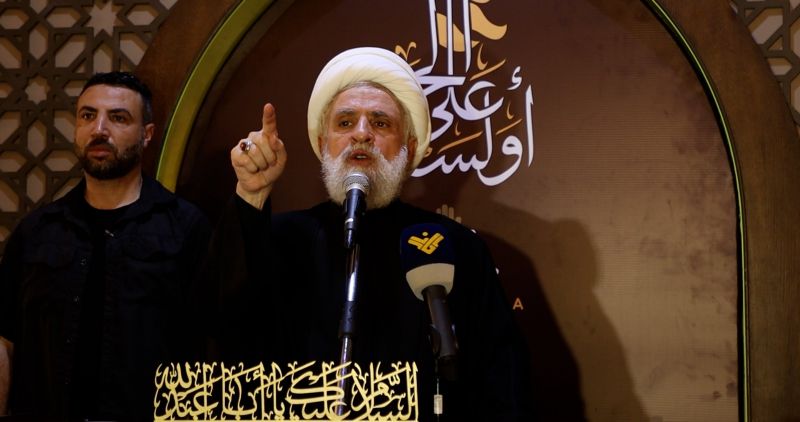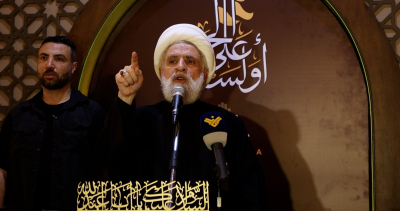Sheikh Naeem Qassem, the Deputy Secretary-General of Hezbollah, delivered a speech at the Ashura council in the Ouzaiyya Hussainiya in Beirut. He stated, "After all the victories we have achieved, some people say: how can you claim that you defeated Israel despite it destroying many houses and killing many people? We want to understand what defeat means and what victory means. When we talk about resistance against an army supported by major countries with all their resources, there cannot be an equivalence between the resistance's capabilities and that army. When there is no military parity, what does the army do? It destroys. But what does the resistance do? It chooses the weaknesses of the army to inflict losses and disrupt its project. Therefore, we are disrupting the project they want. They made a decision back in 2006 to crush the resistance, but the result was that the resistance remained, and the war stopped after the massacre of tanks in the Wadi al-Hujair, with the Israeli side acknowledging its inability to crush the resistance. Thus, it is our right to say we have won because we did not allow them to achieve their goals. Naturally, sacrifice requires losses; the great value lies in the will of the resistors, the one who possesses 5% or 10% against the Israeli possessing 100%, but the spirit of the resistor makes that 10% become 100%, while the 100% the enemy has becomes 10% because they lack the will to fight, fear in the battlefield, and flee from confrontation."
He added: "In Gaza, all of Netanyahu's statements indicate that he wants the war to continue, even if it lasts for months or years! He deceives and lies when he speaks of agreeing to a ceasefire, because he sets preconditions that state that if the ceasefire breaks for the first phase (i.e., within 48 hours), the Israeli wants to return to fighting. Who will agree to that? Is it reasonable for Hamas and the resistance to agree to a ceasefire for 48 hours and release prisoners, and then afterward say: 'Go ahead and continue fighting'? Is that conceivable? America is not pressuring sufficiently, because America's priority is to ensure Israel is comfortable; therefore, America deceives in its pressures."
Qassem continued: "If the war lasts for many months, according to our information, the resistance in Gaza and the Palestinian people will endure no matter how long the war lasts, possessing the resources and will to persist until achieving victory by not allowing Israel to accomplish its goals, whether through extermination or surrender. Thus, the longer the time goes, the more Israel will lose, and the sacrifices made by the Palestinians will be a reason to build a future that will not abandon Palestine again, leading to children being born as resistors because they see with their eyes how their parents and siblings are killed. With the will and resistance, victory will surely be theirs."
He commented, "There is now an important opportunity to pressure Israel to stop. After we have seen the failure of American pressure, its lack of seriousness, and Israel’s insistence on continuing, it has become necessary to seek creative pressure to put a stop to Israel. Now, there is an opportunity for Arab and Islamic countries to courageously stand together for once; I am not saying they should fight Israel but rather that those who have economic or political ties should sever them, and those who have promises to Israel should stop them. If the Arab League and the Organization of Islamic Cooperation can meet to present a unified stance rejecting what is happening in Gaza and push this call into practical deterrent measures against Israel, as the resistance axis has done—not on a military level, at least on the political, economic, and practical levels—then Israel will feel surrounded, and America will sense that all Arab countries stand united, which could further develop if the problem in Gaza is not solved."
In the Lebanese context, Qassem asked: "Some who confront and issue statements about the war and their view on distancing Lebanon from it, what is the national interest in some coming forth to stab the resistance in the back and start raising questions that have no time now, or demanding to abolish Lebanon's capabilities under various pretexts while we are in the field, justifying Israel's actions and promoting not confronting it and suggesting options that undermine Lebanon's capabilities and strength during confrontations and sacrifices? What is the national interest in that? You know that by doing so, you increase our determination and resolve, urging us to be more vigilant so that you do not stab us in the back."
He concluded: "It is important that we end this debate. If you want there to be a president in Lebanon, what is the need to reject the idea of dialogue? They answer that we do not want to engage in dialogue so that it does not become a custom! We call for dialogue; discuss for a short period of time to transition from dialogue to election. However, remaining entrenched for a year and a half behind rigid opinions that do not move in agreement with all parties means that things will be delayed significantly. Whoever wishes to accomplish the presidential entitlement must expedite offering some facilities, concessions, and discussions to arrive at an understanding. Anyone who uses the Gaza war as an excuse, claiming that the solution will only come after the Gaza war ends, does not speak accurately, because the Gaza war has nothing to do with the delay in electing a president for Lebanon. The real reason for not electing a president is the internal fragmentation, the disunity, and the rigidity of positions. If a resolution occurs now, tomorrow there could be a president for Lebanon, even if the war is ongoing."




